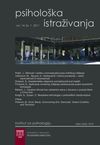Ličnost adolescenata s problemom zavisnosti od interneta i karakteristike njihovih porodica
The Characteristics of Internet Addiction Adolescents and their Families
Author(s): Vesna Dukanac, Tamara Džamonja-Ignjatović, Marko Milanović , Branislava Popović-ĆitićSubject(s): Psychology, Health and medicine and law, ICT Information and Communications Technologies
Published by: Филозофски факултет, Универзитет у Београду
Keywords: internet addiction; adolescents; temperament; character traits; family functioning;
Summary/Abstract: The goal of the study was to identify specific personality characteristics of adolescents who havea problem with “internet addiction”, as well as the characteristics of their parents’ personalities and of thefunctioning of their families. The sample consisted of 60 adolescents of both genders, agedbetween 15 and18. There were 30“internet addicts” belonging to the clinical group and 30 participants from the general population as the control group. Also, 120 parentswere examined;there were 30 parent couples of eachof the two groups of adolescents.The following measures were used in the research: Young’s Internet Addiction Test –IAT, the Belgrade Adolescent Personality Inventory – BAPI, the Temperament and Character Inventory-Revisited –TCI-R (for the assessment of parental personality) and the Family Adaptability and Cohesion Evaluation Scale –FACES IV.The results indicate that adolescents with internet addiction difficulties exhibit a high degree of impulsiveness, low persistence, and immaturity in the personality domains which regulate responsible, goal-directed and co-operative behaviour. The fathers of adolescents from the clinical group were highly ambitious and less available to their children, while their mothers were more impulsive and prone to change versus continuity, which means that they were also less accessible to their children, albeit in a different way than the fathers. All dimensions associated with the positive aspects of family functioning, such as Cohesiveness, Flexibility, Communication and Satisfaction were lower in the clinical group, while the dimension of Chaotic relations was higher. The results have shownthat the parents of adolescents from the clinical group have formed a specific kindof disengaged and distant parenting style that has resultedin avoiding behaviours of adolescents and their withdrawal into the “virtual world”. These findings could have a significant role in understanding the originsof internet addiction, planning prevention programs and defining guidelines for effective therapeutic treatment.
Journal: Psihološka istraživanja
- Issue Year: 18/2015
- Issue No: 2
- Page Range: 165-180
- Page Count: 16
- Language: Serbian

